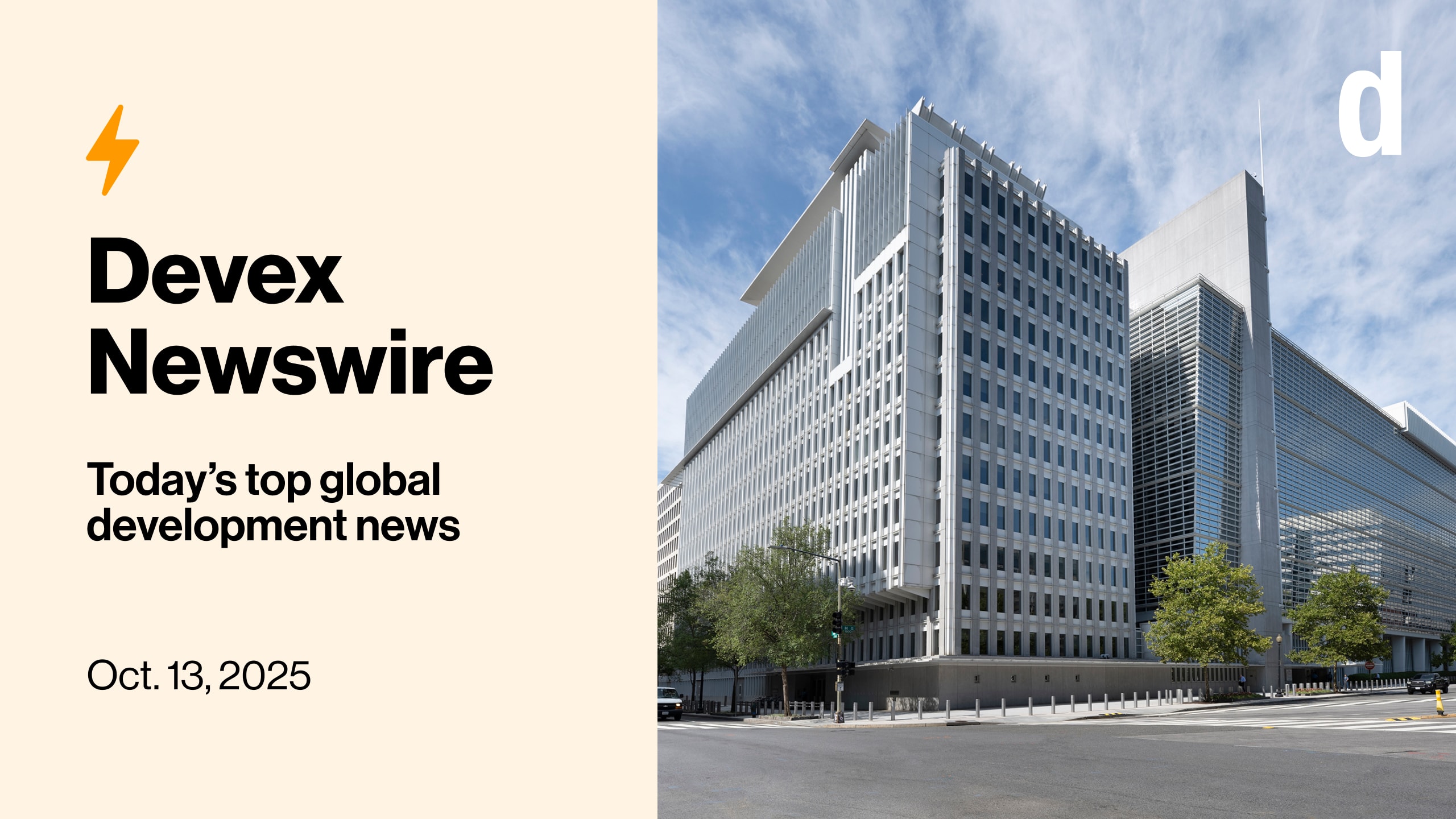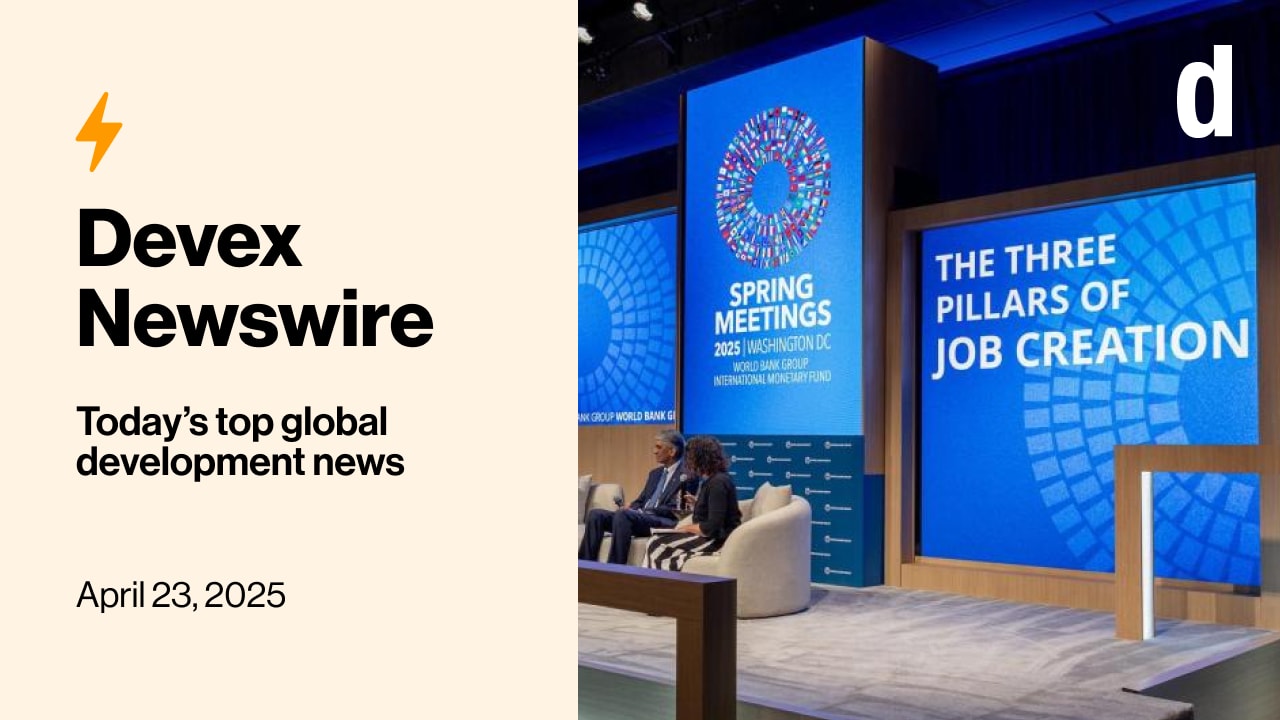Presented by VillageReach

The deadline set for the Sustainable Development Goals was always going to be tough to meet. We look at the latest Goalkeepers report from the Gates Foundation, which claims the world has fallen behind on nearly all the targets.
This is a preview of Newswire
Sign up to this newsletter for an inside look at the biggest stories in global development, in your inbox daily.
Also in today’s edition: The United Nations General Assembly has a lot going on this year. We’re way off the SDGs, there’s a talent gap, people are going hungry, there’s a war and a health and debt crisis. We explain it all.
SDGrim SDGoalkeeping
It’s pretty clear that the Sustainable Development Goals are massively off track; there’s no way we’ll meet the targets before the 2030 deadline. But some cherry-picking may help spur the pace in specific areas and refocus attention that was derailed by COVID-19 and the war in Ukraine.
The Bill & Melinda Gates Foundation reckons progress needs to accelerate fivefold to meet such lofty goals as ending world hunger and ensuring access to clean water. Only five? There may be a zero or two missing from that guess, no?
“Even that might be an underestimate, because some of the projections don’t yet account for the impact of the pandemic, let alone the war in Ukraine or the food crisis it kicked off in Africa,” according to the foundation’s Goalkeepers report released overnight.
While it makes for grim reading, the annual report wasn’t all bad, and failure is not inevitable, it says. In areas like women’s economic empowerment and global food security, there are “massive” opportunities, foundation CEO Mark Suzman tells my colleague Stephanie Beasley.
It’s “a call to action,” he says. So let’s hope world leaders take note when they meet in the coming days at the U.N. General Assembly. Because if not, meeting those goals seems likely to get further and further away.
Read more: Dismal Gates Goalkeepers report centers on women's power, food security
Emergency support
Meanwhile, our Devex Pro Funding team dived into the funding data from the Gates Foundation to figure out the answer to our favorite question: Where did the money go? Over the last 23 years, the foundation has given out 307 emergency response grants — accounting for more than half its total funding — and Pro members can read about the top 10 recipients.
Read: Gates Foundation’s top 10 emergency response grant winners (Pro)
+ With a Devex Pro Funding membership, track over 600,000 sources of global development funding news. You can use it to find information on key partners, set up custom alerts, and access analysis of funding trends. Start your five-day free trial now.
The SDG talent trap
Part of the problem with the SDGs is the financing gap — $4 trillion a year! But another issue needs to be addressed — the talent gap — and closing the divide on one may help trim the breach on the other.
My colleague Jason McNaboe examined the problem — with the help of the Devex community — and found that the vast majority are concerned about the talent gap and its effect on achieving the SDGs.
Read: Does global development have an SDG talent gap?
This is the first in a Devex Career series titled: Bridging the SDG talent gap, which is aimed at reinforcing the big-picture connection between our social enterprise, global development and the SDGs. Stay tuned for more, and take our survey to get involved.
Plus, if you haven’t, sign up for a Devex Career Account membership and get 50% off when you register for our ongoing event series: Mastering the art of LinkedIn and virtual networking, with the final event coming up on Thursday.
Going UNGAry
Food security is top of mind for world leaders gathering at UNGA, as spiking food, fuel, and fertilizer prices sink more and more people into poverty. But Queen Elizabeth II's funeral has thrown a wrench into planning during the assembly’s High-Level Week, so we don't yet have a date for the expected Global Food Security Summit that U.S. President Joe Biden plans to convene. My colleague Teresa Welsh will keep us posted on this front.
She'll also gauge the mood one year after the inaugural U.N. Food Systems Summit, a process that brought together diverse stakeholders within the food system in an effort to transform how the world grows, harvests, and transports food.
ICYMI: The global development issues we're watching at UNGA 77 (Pro)
+ For the inside track on how agriculture, nutrition, sustainability, and more intersect to remake the global food system, sign up for Devex Dish, our free, must-read Wednesday newsletter.
Comfort food
Speaking of food: The International Monetary Fund on Monday began informal discussions at the board level on a food aid program as countries reel from the weight of inflation. The "food shock window" is being considered under IMF's emergency financing arrangements, spokesman Gerry Rice tells my colleague Shabtai Gold. This could allow countries in need to tap more funds than previously available. IMF, Rice says, is looking at "all options to enhance our toolkit."
Waiver goodbye
Zambia has begun its complicated journey toward getting its financial house in order. It needs $8.4 billion in debt relief over three years, according to IMF. In total, its debts well exceed its entire $21 billion GDP last year. So you can imagine the sacrifice the nation’s people face to pay for that.
The real test, though, is how it works out a payment plan with China. It owes China about $6 billion of nearly $17 billion in external debt. There’s a rather long list of countries that owe China money, so how the eastern giant works things out with Zambia will set the tone for others.
But if the latest info is anything to go by, things don’t bode well.
Last month, China announced a surprise waiver of 23 interest-free loans to 17 African countries. China’s scale of forgiveness is actually rather small, though, putting a bit of a damper on things, says Shabtai.
Beijing has long been accused of opaque lending to low-income countries. New research from Boston University’s Global Development Policy Center pinpointed a range for how much it forgave — it’s somewhere between $44.76 million and $609.57 million.
Read more: Zambia eyes $8.4 billion relief, but worries crisis only being delayed
ICYMI: Zambia hails IMF debt deal as it promises a sustainable path ahead
+ For more content like this, sign up for Devex Invested, our free, Tuesday newsletter on how business, social enterprise, and development finance leaders are tackling global challenges.
In other news
The African Development Bank has announced it appointed five women to serve as executive directors on its 20-member board. [Bloomberg]
The United Nations has called on the Taliban to stop the harassment of its staff following the temporary detention of three Afghan women working for its Afghanistan mission. [Reuters]
The number of people trapped in modern slavery has increased in the last five years due to compounding crises brought about by conflict, climate change, and COVID-19. [The Telegraph]
Sign up to Newswire for an inside look at the biggest stories in global development.
Update, Sept. 13, 2022: This article has been updated to better reflect the nature of research from Boston University’s Global Development Policy Center.








